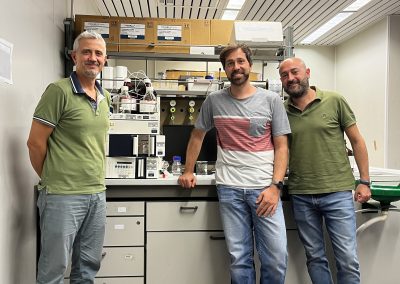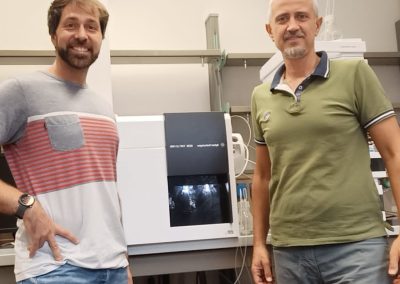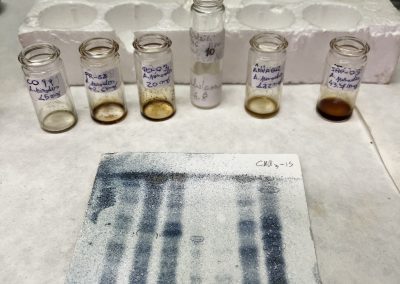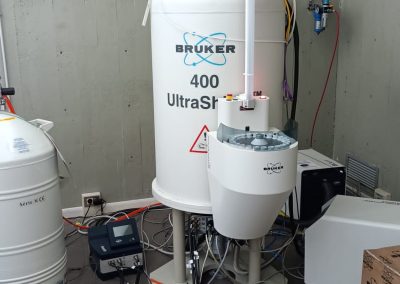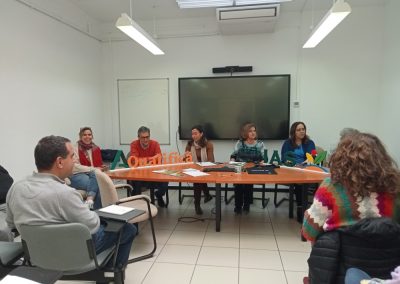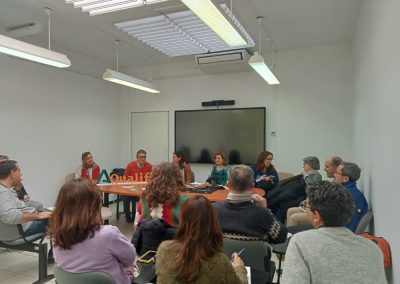Proyecto Qualifica
-
GENERAL DATA
Project title: Improving the resilience and sustainability of the Mediterranean agriculture, from the cell to the agrosystem, to overcome the challenges by 2050.
Financial entity: Junta de Andalucía. Qualifica Projects QUAL21_023 IAS.
Length from January 2023 to December 2025.
Grant amount: 1.000.000,00 €
Scientific Director: Elena Prats, Project Coordinator: Leire Molinero
PROJECT SUMMARY
The main goal of our Qualifica Project is the Development of new tools, technologies and crop modelling in the framework of uncertainties due to climate change.
This will be achieved through three specific goals, each of them tackled by one scientific program of IAS.
- To exploit existing genetic variability and integrate new germplasm and tools to obtain more resilient crops:
- Discovery of genes and/or markers conferring or associated with plant resilience to climate change.
- Exploitation of existing and new genetic variability to develop productive cultivars better adapted to current and future conditions.
- Addressing crop quality and yield stability for food security in a growing population.
- Unravelling the role of biotic threats and ecosystem services in resilience and sustainability of Andalusian countryside crops:
- Decision support systems for crop protection and early detection of plant diseases and disease resistance.
- Acting on the soil as the environment of the plant-pathogen pairing under the scope of circular economy.
- Tools for reducing herbicide dependence and improving biodiversity and ecosystem services in agriculture.
- Advanced agrosystem monitoring and modelling to face actual and future threats:
- Filling gaps in the modelling of processes and crops for understanding agrosystems and definition of ideotypes in annual and tree crops.
- Development of new sensor technologies for understanding genotype by environment interactions and optimal crop management.
- Delivery of effective solutions for decision support and monitoring in climate-smart systems.
-
QUALIFICA PhD FELLOWSHIPS
Qualifica Project offers the possibility to fund three PhD fellowships to develop a PhD Thesis conducted as a transdisciplinary enterprise between two of the three IAS departments
1. Project title: Pea breeding for resistance to parasitic nematodes
Supervisors: Diego Rubiales , Juan Emilio Palomares
Departaments: Plant Breeding, Crop Protection
PhD Student: María Córdoba Sánchez.
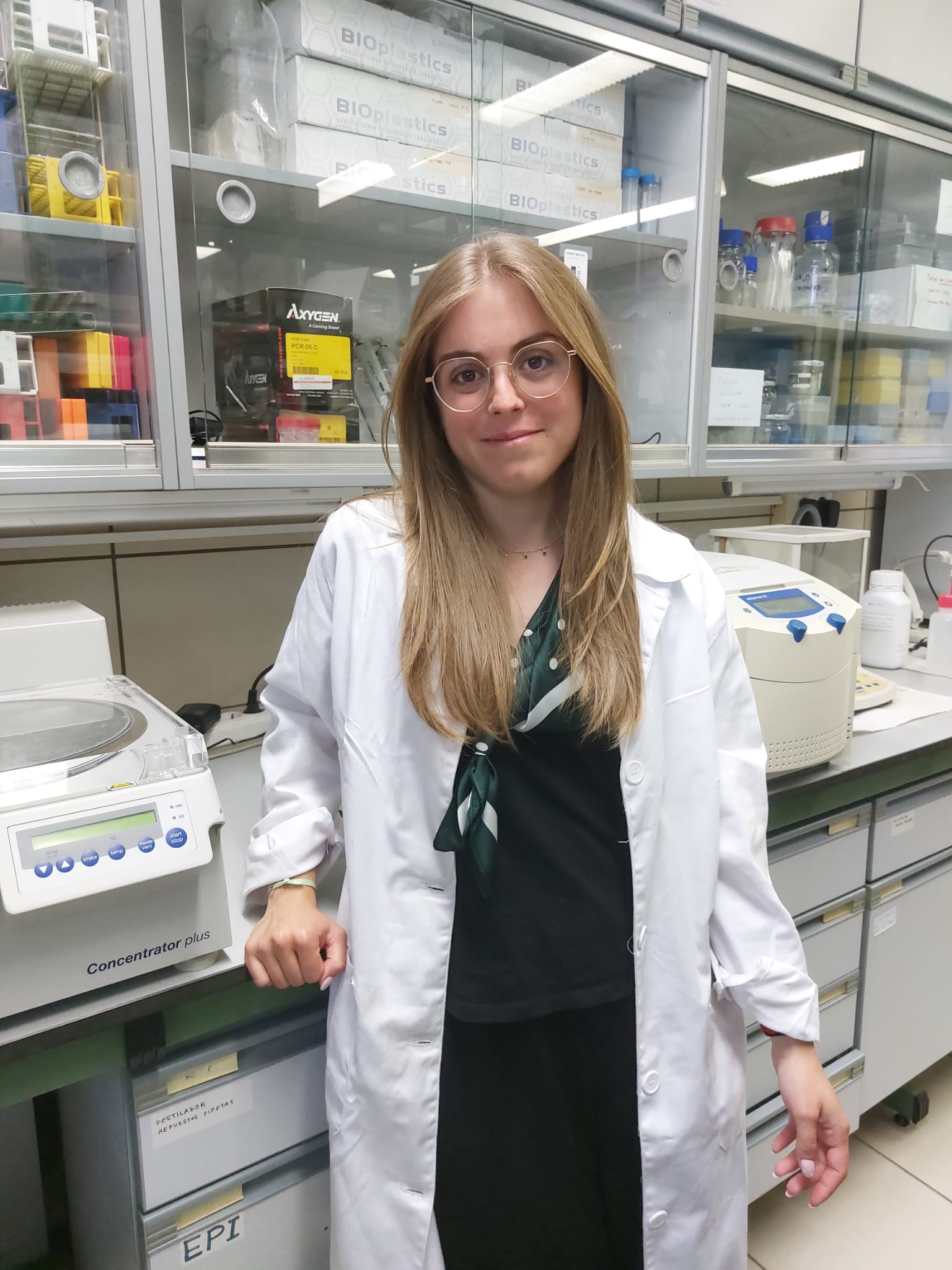
Sumary of the project:
Pea (Pisum sativum L.) is a grain legume widely cultivated in temperate climates with well-known environmental benefits by improving soil fertility, biodiversity preservation, and nutritional functions as food and feed. The dry pea is the most grown temperate grain legume in Europe and in Spain. Even when cultivation decreased in Europe in past decades it is now speedily recovering. In Spain, contrary to other legumes whose cultivation is decreasing or stable, pea acreage has doubled in last decade, with clear expectative for a sustained growth.
Like any crop, pea production can be constrained by different diseases, requiring efforts in integrated pest management, with genetic resistance playing a major role. Two major groups of plant-parasitic nematodes reported to cause important losses in pea will be covered: i) Endoparasite sedentary [root-knot (Meloidogyne spp.) and cyst (Heterodera spp.)] nematodes; Some resistance to the pea cyst nematode Heterodera goettingiana has been reported pea wild relatives (P. abyssinicum, P. arvense and P. elatius, but this has not been studied further; –ii) Migratory endoparasite root-lesion nematodes (Pratylenchus spp.) to which no resistance at all have been described in pea.
The main objectives of this PhD proposal are to improve nematode detection and quantification methods in the soil and plant, and to identify and characterize new sources of resistance in pea for cyst nematodes (Heteradora goettingiana) and root-lesion nematodes (Pratylenchus neglectus-P. thornei). For this main proposal several sub-objectives will followed:
- Molecular detection tools for goettingiana. Dr. Palomares has already studied some molecular markers for species identification. PCR tools will be designed for an efficient identification and quantification in field and “in planta” and optimized-tested in several populations of the nematode.
- Identification of sources of resistance against goettingiana and P. neglectus–P. thornei in Pisum spp. previous optimization of screening tools.
Identification of molecular markers linked with resistance by Genome Wide - Association Studies (GWAS, using a pea panel already genotyped) and utilization of sources of resistance in pea breeding.
2. Project title: Restoring crop and soil health in agricultural systems exploiting synergies in nature based solutions
Supervisors: José Alfonso Gómez, Leire Molinero
Departments: Agronomy, Crop Protection
PhD Student: Ana Domínguez Carmona.

Sumary of the project:
Sustainability of agricultural production to achieve the Sustainable Development Goals for 2030 requires improvement of agricultural soils health, as wells as innovative ways to improve crops health reducing agrochemicals use. To achieve this, there is increasing interest in research combining nature-based solutions relying on organic amendments and vegetation in a synergistic way, taking advantage of new knowledge on the physical, chemical and biological aspects of soils. This project is aimed to train a researcher specialized in this area, with a transversal education encompassing soil science, agronomy, and plant pathology. It has five main objectives, which articulate the research, dissemination and training activities.
1- A comprehensive evaluation of effect of compost from three different origins (olive industry, avian and pork breeding) coming from reliable producers on selected indicators of soil health: aggregate stability, organic carbon content, soil microbiota, control of selected plant diseases (Verticillium , Orobanche minor, Sclerotinia) identifying the chemical profile/s of the exudate/s responsible of such action. This will complemented with a review of optimum traits for improving those indicators among Mediterranean autochthonous cover crop species.
2- Development and testing, under semi-controlled conditions, of viable strategies for incorporating the combined used of compost+cover crops into selected agricultural systems: within rotation in field crops, or temporary cover crops in orchard, developing guidelines on doses, species and timing depending on agroecological conditions.
3- Evaluation of the variability of the selected features of interest (exudate profile, composition, moisture, organic carbon content, …) in compost within and among different providers.
4- A scientific and technical dissemination plan, combining traditional and digital channels in cooperation with stakeholders, such as DOP Estepa, Asociación Española de Girasol (AEG).
5- This PhD project will pursue and international doctorate within the joint (U. Cordoba, CSIC, …) doctorate program” Ingeniería Agraria, Alimentaria, Forestal y de Desarrollo Rural Sostenible” including research stays on the main lines of research: IPB (Portugal, Dr. P. Baptista) for agricultural microbiology, including plant pathology, BOKU (Austria, Dr. S. Strohmeier) for soil physical properties, and U. Jaen (Dr. R. García) for compost quality issues.
3. Project title: Genomic and phenomic tools to improve drought tolerance in wheat
Supervisors: Francisco Barro, José A. Jiménez-Berni
Departments: Plant Breeding, Agronomy
PhD Student: José Rodolfo Quintana Molina

Summary of the project:
Drought is one of the most critical environmental stresses in the Mediterranean area, decreasing plant growth and crop productivity, representing a significant challenge for European agriculture due to climate change projections. Drought stress elicits a wide range of responses in plants. Characterizing drought-related physiological and genetic traits requires laborious measurements, most often based on destructive sampling. Novel plant phenomics techniques provide high-throughput alternatives to traditional phenotyping and physiological measures. In association with current genome sequencing and gene expression techniques, Phenomics is the new state-of-the-art avenue for discovering new genes and gene functions in plant science.
In this proposal, we selected 121 durum and bread wheat Spanish accessions representing all the agroclimatic regions. We also added 6 varieties of tritordeum (a hybrid between durum wheat and a wild barley developed at the IAS-CSIC) and 10 commercial wheat varieties that will be included as references.
The general objective of the project is the identification of new candidate genes that can be incorporated into more resilient genotypes that will be able to cope with suboptimal water availability derived from drought and erratic rainfall patterns.
The specific objectives are:
- Phenotyping of wheat accessions under different water availability regimes generated with supplemental irrigation and rainfed conditions using novel phenomic techniques, such as aerial thermography and multispectral combines with ground-based LiDAR and hyperspectral.
- Genotyping and gene expression analysis of selected genotypes under the different drought regimes for identifying candidate genes using GWAS and QTL analysis based on the observed phenomic data.
- Unravelling of the drought tolerance physiological mechanisms underpinned by the candidate genes for further use in plant breeding and more detailed physiological studies towards understanding genotype by environment interactions.
The training potential of the project is exceptionally high as the PhD student will have the opportunity of learning a wide range of agronomic, phenomic and breeding techniques, including bioinformatics using machine learning and big-data analysis tools. This project will provide the student with a crossover of cutting-edge omics techniques with hands-on experience in plant breeding and agronomy.
-
QUALIFICA SHORT STAYS GRANTS
Qualifica Project offers the possibility to apply for short stays to develop the three main specific goals of the project
1. short stay
Researcher: Pierluigi Reveglia
Destination: Natural Bioactive Compounds (SNAB) group in the Department of Chemistry at the University of Naples Federico II, led by Professor Alessio Cimmino and Dr. Marco Masi. They are experts in the purification and identification of natural compounds produced by microorganisms and plants using spectroscopic methods
Dates: 06/10/2023 – 25/10/2023
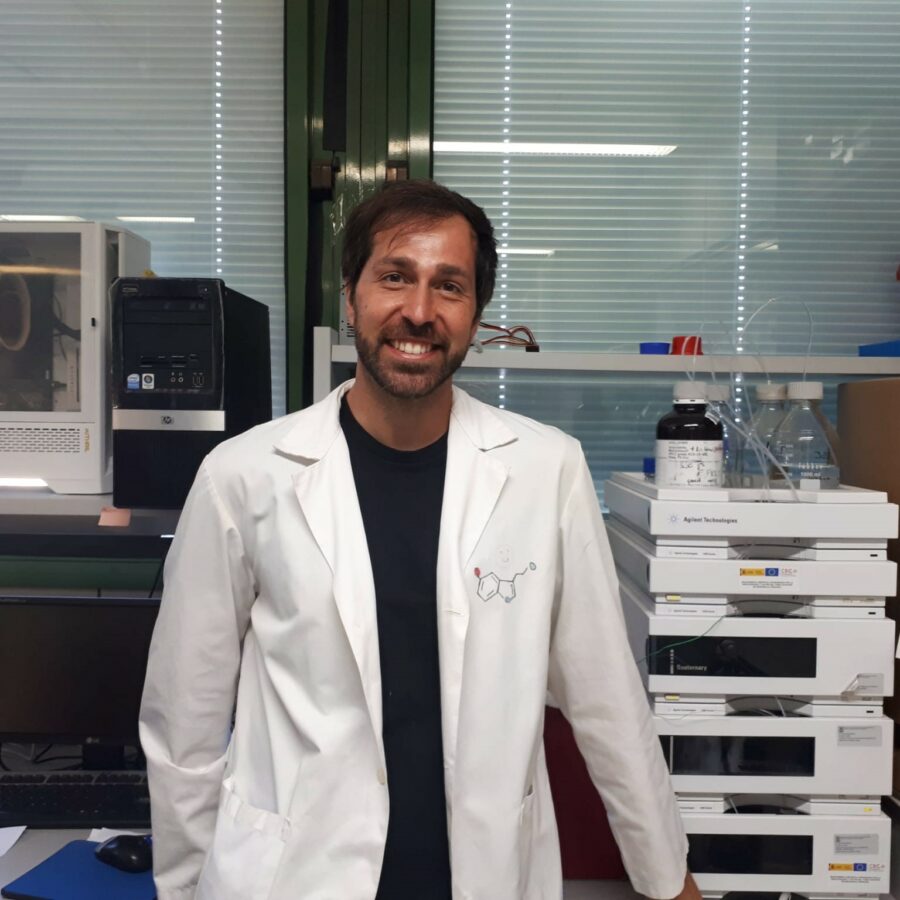
Summary of the project:
The main objective of the stay is to carry out dual untargeted and targeted metabolomics analysis to investigate the metabolic changes in two pea genotypes inoculated with Ascochyta pinodes. The two selected genotypes have different degrees of susceptibility to the fungal pathogen. Moreover, two sampling times were considered to study the evolution of the pathosystem longitudinally.
The targeted and untargeted metabolomics will be carried out using the Liquid Tandem Mass Spectrometry (LC-MS/MS) instruments in the Department of Chemical Sciences at the University of Naples Federico II.
This stay is part of a multi-omics study that includes dual transcriptomic and proteomics to evaluate the interaction during the infection process of A.pinodes. The dual transcriptomic, as well as the inoculation and symptoms evaluation, has been performed in the research group of Plant Breeding for Stress Resistance led by Dr Diego Rubiales.
The experiments performed during the stay provide valuable insights into the complex metabolic pathways and interactions between the Pea and the pathogen. By simultaneously analyzing both primary and secondary metabolites, it will be possible to identify critical compounds associated with desirable traits such as nutritional quality, disease resistance, and yield. This comprehensive understanding of the plant’s metabolic profile could facilitate the development of improved pea varieties with enhanced agronomic characteristics. A dual omic approach could ultimately identify potential biomarkers for early disease detection and more sustainable control methods.
-
QUALIFICA MEETINGS
18 Months Meeting
This meeting of Qualifica project has taken place coinciding with the 18 months since the beginning of the project. The researchers have discussed on the progress of the different work packages, about the budget and future actions/suggestion have been proposed for the following months to maximize scientific excellence of the Institute achieved in the frame of the project.
Date: 10 July 2024
First Annual Meeting
In this first annual meeting of Qualifica project, participants shared their advance in the project, were informed about the report presented at the end of the year, and discussed about the next steps to maximize the benefits of the project in terms of increasing scientific knowledge and scientific excellence of the Institute.
Date: 31 January 2024

